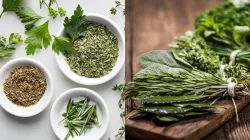Dried Herbs vs Fresh Herbs: Which one is better?
Fresh herbs add a vibrant touch to any dish, but dried herbs offer convenience and a long shelf life. So, which one reigns supreme in the health department? The answer, like many things in cooking, depends!

Herbs have been celebrated for their culinary and medicinal uses for centuries. They add flavour, aroma, and colour to dishes and boast a range of health benefits. However, a common question that arises in the kitchen is whether dried herbs or fresh herbs are healthier. Both forms have their own unique properties and benefits, and the choice between them can depend on several factors including nutritional content, convenience, flavour, and shelf life. This article delves into the comparison between dried and fresh herbs to help you make an informed decision.
Nutritional Content
Fresh herbs bursting with vitamins, minerals, and antioxidants, maintaining their full nutrient profile in their natural state. For instance, fresh parsley is a vitamin C powerhouse. Drying herbs concentrates flavours and some nutrients but may lead to the loss of volatile oils and heat-sensitive nutrients like vitamin C. However, dried herbs can be richer in antioxidants per gram due to their concentrated nature, such as dried oregano boasting higher antioxidant levels.
Flavor and Aroma
Fresh herbs offer vibrant, intense flavours with their preserved essential oils. Their taste, like that of fresh basil's sweet peppery notes, can be challenging to replicate with dried counterparts. Dried herbs, on the other hand, present a more concentrated flavour profile owing to the absence of water, though some delicate nuances may be lost during drying. Their pungent taste is perfect for slow-cooked dishes, allowing flavours to infuse over time.
Convenience and Shelf Life
Fresh herbs demand refrigeration and are best used within a week to maintain potency, requiring chopping or mincing before use. Contrastingly, dried herbs boast convenience and a lengthy shelf life of up to a year if stored properly. Ready to use straight from the container, they're ideal for quick meal preparation, making them a practical choice for busy lifestyles.
Culinary Uses
Fresh herbs shine in salads, garnishes, and dishes needing a fresh flavour burst, like pestos and salsas. Some, like cilantro and parsley, are preferred fresh for their distinct taste. Dried herbs, however, excel in seasoning meats, stews, and sauces, slowly releasing their flavours during cooking. Their concentrated nature makes them perfect for spice blends and rubs.
Health Benefits
Fresh herbs' high water content and certain vitamins and enzymes offer hydration and direct nutrient sources. Additionally, their fibre content supports a healthy gut microbiome. Dried herbs, despite losing some nutrients, provide significant health benefits. Rich in antioxidants, they help reduce inflammation and protect against chronic diseases, requiring smaller amounts to achieve desired health benefits.
In the debate between dried and fresh herbs, there is no definitive answer as to which is better. Each form has its unique advantages and applications. Fresh herbs provide a burst of flavour and essential nutrients that are ideal for raw and lightly cooked dishes. Dried herbs offer convenience, a longer shelf life, and a concentrated source of certain nutrients and antioxidants, making them perfect for slow-cooked meals and spice mixes.
ALSO READ: Duck Eggs vs Chicken Eggs: Which is healthier?